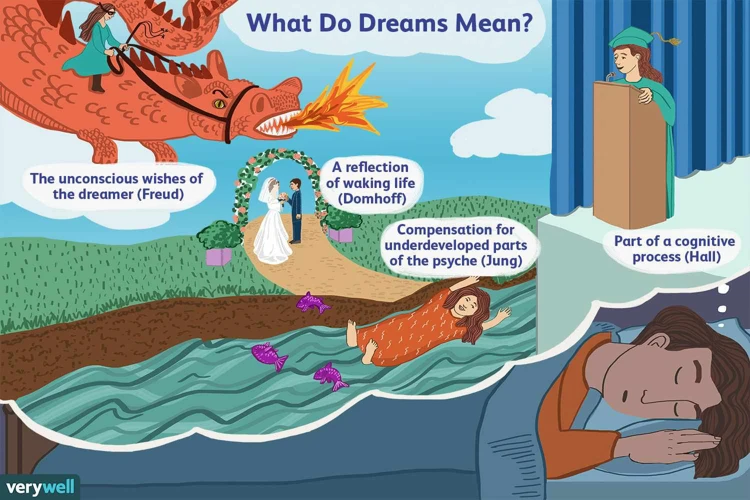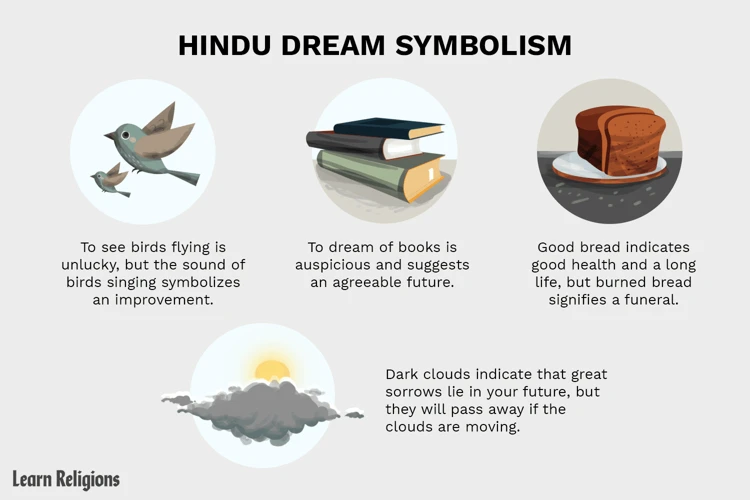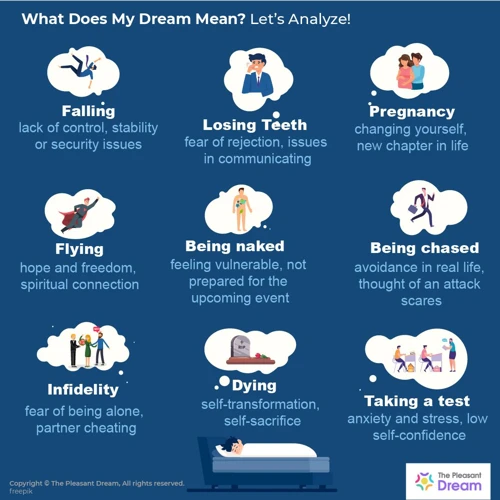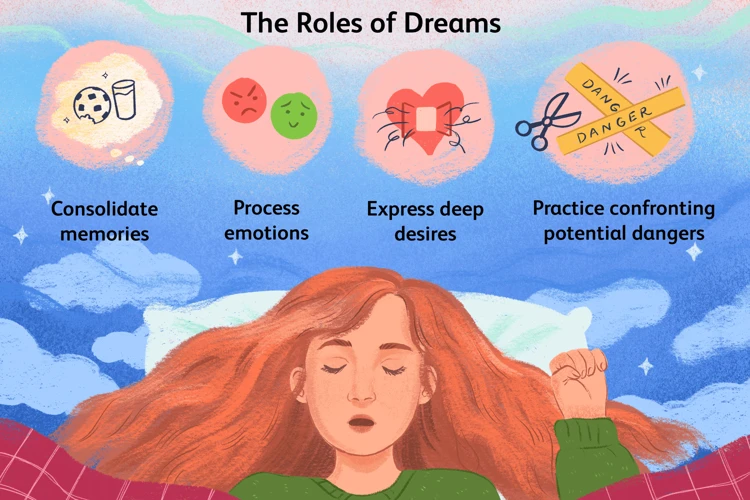Have you ever wondered about the mysterious realm of dreams? As we sleep, our minds conjure up a vivid tapestry of images, emotions, and experiences that may seem confusing or nonsensical. But behind these dreams lies a vast array of symbolism and meaning waiting to be unraveled. In this article, we will dive deep into the realm of dreams, exploring their importance, deciphering common symbols, understanding different types of dreams, and learning how to interpret them. Get ready to embark on a journey of self-discovery as we explore the fascinating world of dream interpretation.
The Importance of Dreams

The importance of dreams cannot be overstated. They serve as a window into our subconscious mind, providing insights into our deepest desires, fears, and emotions. Dreams have been a subject of fascination and study for centuries, with cultures around the world attributing spiritual and psychological significance to them. By paying attention to our dreams and delving into their symbolism, we can gain valuable insights into our own lives and experiences. Whether it is unraveling the meaning of a recurring dream or seeking guidance through a vivid dream experience, dreams have the potential to provide us with valuable information and self-reflection. Understanding the importance of dreams is the first step in unlocking the hidden messages they hold.
Common Dream Symbols

Dreams often contain a myriad of symbols that can hold significant meaning. Understanding these common dream symbols can help us interpret the messages hidden within our dreams. Flying is a symbol of freedom, liberation, and the ability to rise above challenges. Falling signifies a loss of control, insecurities, or a fear of failure. Teeth falling out represents anxiety, vulnerability, and concerns about appearance or communication. Being chased signifies a feeling of being pursued, either by external forces or internal fears. Naked in public represents vulnerability, self-esteem issues, or a fear of being exposed. Exploring the symbolism behind these common dream symbols can provide valuable insights into our subconscious mind and the emotions that may be influencing our waking lives.
1. Flying
Flying is a common dream symbol that often represents a sense of freedom, liberation, or empowerment. When you dream of flying, it can signify a desire to break free from limitations or soar above life’s challenges. This dream can also symbolize a need for independence and the ability to rise above obstacles. In some cases, flying dreams may reflect a sense of control and confidence in one’s own abilities. It is important to consider the specific context and emotions surrounding the dream to gain a deeper understanding of its meaning. While flying dreams can have various interpretations, it is generally seen as a positive symbol of personal growth and the pursuit of aspirations.
2. Falling
The dream symbol of falling often evokes a sense of fear and loss of control. It is a common dream experience that can have various interpretations depending on the context. Falling in a dream may represent feelings of insecurity, instability, or a lack of support in waking life. It could also symbolize a fear of failure or the need to let go of something or someone. Additionally, falling dreams can be linked to a sense of vulnerability or a fear of the unknown. Understanding the symbolism behind falling dreams can provide valuable insights into one’s emotional state and can serve as a prompt for personal reflection and growth.
3. Teeth Falling Out
Teeth falling out is a common dream symbol that can evoke a range of emotions and interpretations. In dreams, losing teeth can often represent feelings of vulnerability, powerlessness, or a fear of aging. It can also be associated with concerns about appearance or self-image. While the specific meaning of this dream symbol can vary depending on the individual and their personal experiences, it often points to underlying anxieties or insecurities. It is important to remember that dream interpretation is subjective and can be influenced by cultural and personal associations. Exploring the emotional context and personal associations of the dreamer is crucial in unraveling the true meaning behind teeth falling out dreams. To understand more about dream symbolism, you can read our article on “What is the Meaning of Dreams?” [link to /what-is-meaning-of-dream/].
4. Being Chased
Being chased in a dream can evoke feelings of fear and anxiety. This common dream symbol often represents a sense of being pursued or hunted by something in our waking lives that we are trying to avoid or escape from. The chaser in the dream may manifest as a person, an animal, or even an abstract force. Analyzing the context and emotions surrounding the chase can provide valuable insights into the underlying issues we may be facing. It is important to consider the specific details of the dream and our personal associations with being chased. By exploring the symbolism and examining our own emotions, we can begin to unravel the deeper meaning behind this recurring dream theme.
5. Naked in Public
Dreams of being naked in public can be quite unsettling and leave us feeling vulnerable and exposed. This common dream symbol often represents feelings of insecurity or a fear of judgment from others. It may suggest that we are grappling with a sense of inadequacy or the fear of being seen for who we truly are. This dream can also be associated with a desire for authenticity and the need to embrace our true selves without fear of judgment. Exploring the meaning behind this dream can provide valuable insights into our self-image and the need for self-acceptance. Understanding the symbolism behind being naked in public in our dreams can help us address underlying issues and gain a greater sense of confidence and self-assurance.
Types of Dreams

Dreams come in various forms and each type holds its own significance. Lucid dreams are a fascinating phenomenon where the dreamer becomes aware that they are dreaming, allowing them to have some control over the dream’s content and direction. These dreams can be empowering and provide a sense of freedom within the dream world. Recurring dreams are dreams that repeat themselves over time, often reflecting unresolved issues or recurring thoughts in the dreamer’s subconscious. They can offer valuable insights into areas of our lives where we may need to address and find resolution. On the darker side, we have nightmares. These disturbing dreams can evoke intense fear, anxiety, and even wake us up in a state of panic. Nightmares may signify deep-rooted fears or unresolved traumas that need attention. Understanding the different types of dreams allows us to explore the inner workings of our subconscious mind and gain a deeper understanding of ourselves in the process.
1. Lucid Dreams
Lucid dreams are a fascinating phenomenon that occurs when we become aware that we are dreaming while still in the dream state. In a lucid dream, we have the ability to control and manipulate the events, surroundings, and actions within the dream. This heightened state of self-awareness opens up a realm of possibilities, allowing us to explore our fantasies, face our fears, and tap into our creativity. Some people even use lucid dreaming as a tool for self-improvement and personal growth. By actively participating and shaping the dream narrative, we can gain valuable insights, practice new skills, and overcome challenges. Lucid dreams offer a unique and empowering experience that allows us to navigate the boundaries between reality and imagination, stepping into a world of limitless possibilities. So, how can we achieve lucidity in our dreams? Stay tuned to find out more!
2. Recurring Dreams
Recurring dreams are a fascinating aspect of the dream world. These are dreams that repeat themselves over and over again, often with similar themes, settings, or scenarios. They can be both intriguing and perplexing as they seem to hold a special message or significance. When we experience recurring dreams, our subconscious is trying to draw our attention to something important that we may be overlooking in our waking life. These dreams may indicate unresolved issues, unfulfilled desires, or persistent worries that need to be addressed. By exploring the patterns and symbols in recurring dreams, we can gain insights into ourselves and take steps towards growth and healing. Understanding the significance of recurring dreams can lead to a deeper understanding of our own psyche and the messages our subconscious is trying to convey.
3. Nightmares
Nightmares are a type of dream that can leave us feeling terrified and unsettled upon waking up. These intense and distressing dreams often involve situations or experiences that evoke fear, anxiety, or dread. Nightmares can stem from a variety of factors, such as stress, trauma, or even certain medications. They can be linked to unresolved emotions or subconscious fears that manifest during sleep. While nightmares can be unsettling, they can also serve as valuable opportunities for self-reflection and personal growth. By examining the underlying emotions and symbols presented in nightmares, we can gain insights into our fears and anxieties, helping us address them in our waking lives. Understanding and interpreting nightmares can be a powerful tool in working through our innermost struggles and finding ways to overcome them.
Understanding Dream Interpretation

Understanding dream interpretation involves delving into the intricate web of symbols and meanings that our dreams present. It is an art that requires careful analysis and a deep understanding of the individual’s psyche. One of the key aspects of interpretation is analyzing the symbols within the dream. Every person’s dream symbols may differ, and it is important to consider personal associations and cultural influences when deciphering their meaning. For example, while dreaming of rain may symbolize renewal and cleansing for some, it may hold different significance for others based on their cultural or personal experiences. Emotional context also plays a vital role in understanding dream interpretation, as the feelings experienced during a dream can provide valuable insights into the dreamer’s subconscious. By unraveling the layers of symbolism, considering personal associations and cultural influences, and exploring the emotional context, we can begin to decipher the meaning and messages hidden within our dreams.
1. Analyzing Symbols
Analyzing symbols is a crucial step in understanding the meaning of dreams. Dreams are filled with intricate imagery that often holds deeper significance beyond their surface appearance. To analyze symbols, it is helpful to keep a dream journal and document the different images, objects, and people that appear in your dreams. Consider the emotions and associations these symbols evoke. Some symbols may have universal meanings, while others may be unique to your own personal experiences and beliefs. By examining the symbolism within your dreams and exploring their possible interpretations, you can gain a deeper understanding of the messages your subconscious is trying to convey. In doing so, you can unlock valuable insights into your innermost thoughts and feelings.
2. Personal Associations
Personal associations play a crucial role in dream interpretation. While there are common symbols that hold collective meanings, it is important to consider our own unique experiences and emotions when analyzing our dreams. The same symbol can hold different significance for different individuals based on their personal associations. For example, dreaming about rain may have a different meaning for someone who grew up in a drought-prone region compared to someone who associates rain with growth and abundance. By examining our personal connections to symbols and events in our dreams, we can uncover deeper layers of meaning and gain a better understanding of ourselves.
3. Cultural Influences
Cultural influences play a significant role in dream interpretation. Our cultural backgrounds, beliefs, and experiences shape the way we perceive symbols and assign meaning to them in our dreams. Different cultures have unique interpretations for common dream symbols. For example, in some cultures, dreaming about rain symbolizes fertility and a good harvest, while in others it can represent purification or the need for emotional release. These cultural influences can be passed down through generations, affecting how individuals from certain backgrounds interpret their dreams. Understanding the cultural context of dream symbolism can enhance our ability to uncover the deeper meanings hidden within our dreams.
4. Emotional Context
The emotional context of a dream plays a crucial role in its interpretation. Our dreams are often deeply intertwined with our emotions, as they provide an outlet for processing and expressing our feelings. When analyzing a dream, it is important to consider the emotions that were present during the dream and upon waking up. The intensity of the emotions, whether they were positive or negative, and how they relate to your waking life can offer valuable insights into the meaning of the dream. For example, a dream filled with feelings of fear and anxiety may symbolize underlying stress or unresolved issues in your life. Conversely, a dream brimming with joy and excitement may signify a positive outlook or an upcoming event to look forward to. By exploring the emotional context of your dreams, you can gain a deeper understanding of yourself and your experiences.
Interpreting Common Dreams
Interpreting common dreams can be both intriguing and enlightening. By understanding the symbolism behind these dreams, we can unravel the hidden messages they carry. Let’s explore a few of these common dreams and their possible interpretations. One frequent dream is the dream of falling, which is often associated with feelings of insecurity or a lack of control in one’s life. Being chased in a dream may represent avoidance or a fear of confronting an issue. Teeth falling out in a dream can symbolize a loss of power or a fear of aging. Dreams of flying often signify a sense of freedom, empowerment, or escape from constraints. Lastly, the dream of being naked in public may reflect vulnerability or a fear of judgment. Understanding the possible meanings behind these common dreams can give us valuable insights into our subconscious mind, allowing for self-reflection and personal growth.
Link: what the meaning of dream
1. Dream of Falling
The dream of falling is a common and often perplexing experience. It can evoke a sense of fear and anxiety, leaving us with a lingering sense of unease upon waking. Falling in a dream is typically associated with a loss of control or a fear of failure. It may signify a lack of stability or security in our waking lives. While the dream of falling can be distressing, it can also serve as a metaphor for letting go or surrendering to the unknown. Exploring the symbolism and personal associations surrounding this dream can provide valuable insights into our fears, insecurities, and our ability to navigate the unpredictable nature of life. Whether it is interpreting the dream of falling as a metaphor for a challenging situation or as a sign of the need for balance and stability, understanding the meaning behind this dream can offer us valuable self-reflection and growth. For more information on the biblical meaning of rain in a dream, click here.
2. Dream of Being Chased
The dream of being chased is a common and intense experience that can leave us feeling anxious and fearful upon waking up. In this dream, the feeling of being pursued by an unknown entity or force can elicit strong emotions and a sense of urgency. While the exact meaning of this dream can vary from person to person, there are some common interpretations. Being chased in a dream may symbolize running away from a problem or situation in waking life, feeling overwhelmed or pursued by responsibilities, or even avoiding confronting our own fears or insecurities. It is important to consider the context and emotions experienced during the dream to gain a deeper understanding of its significance. Exploring the underlying emotions and identifying potential triggers in our waking life can help us make sense of the dream and address any underlying issues that may need attention.
3. Dream of Teeth Falling Out
The dream of teeth falling out is a common and perplexing dream symbol. Many people experience this dream at some point in their lives, and it can leave them feeling unsettled and anxious upon waking. While the exact interpretation may vary depending on the individual and their personal associations, there are some common themes that can be explored. In general, dreaming of teeth falling out is often associated with feelings of powerlessness, vulnerability, or a loss of control. It can also suggest concerns about appearance, communication, or self-image. Exploring the emotional context and personal associations surrounding this dream can provide further insights into its meaning and significance.
4. Dream of Flying
The dream of flying is one of the most common and exhilarating dreams people experience. It represents a sense of freedom, liberation, and control. When we dream of flying, we often feel a rush of joy and excitement as we soar through the sky, defying gravity. This dream can symbolize a desire for independence and the ability to rise above obstacles or limitations in our waking life. It may reflect a sense of empowerment or a longing for escape from the mundane. In some cases, dreaming of flying can also signify a need for more control or a reminder to take a broader perspective on a situation. Regardless of the specific interpretation, the dream of flying is a powerful symbol that taps into our deepest aspirations and desires.
5. Dream of Being Naked in Public
The dream of being naked in public is a common symbol that can evoke feelings of vulnerability and embarrassment. This dream often represents a fear of being exposed or judged for who we truly are. It may reflect insecurities or a fear of being seen as inadequate in some aspect of our lives. Alternatively, this dream could also symbolize a desire for authenticity and a need to show our true selves to the world. It’s important to consider the specific context and emotional response within the dream to gain a deeper understanding of its meaning.
Conclusion
In conclusion, dreams are a fascinating and intricate part of the human experience. They hold deep symbolism and meaning that can provide us with valuable insights into our subconscious mind. By exploring and interpreting our dreams, we have the opportunity to gain a deeper understanding of ourselves, our emotions, and our inner desires. While dream interpretation can be subjective and vary from person to person, it is a worthwhile endeavor that allows us to tap into our own inner wisdom. So, next time you find yourself waking up from a vivid dream, take a moment to reflect on its possible meanings and the messages it may be trying to convey. Embrace the mysterious world of dreams and allow them to guide you on your journey of self-discovery.
Frequently Asked Questions
1. Why do we dream?
Dreaming is believed to be the result of the brain’s activity during sleep. It is a way for our minds to process emotions, memories, and experiences from our waking life.
2. Do dreams have meanings?
While the exact meaning of dreams varies from person to person, many psychologists and experts believe that dreams are symbolic and can offer insights into our subconscious thoughts and emotions.
3. Can dreams predict the future?
There is no scientific evidence to support the notion that dreams can predict the future. However, some individuals claim to have had precognitive dreams that seemed to foretell future events.
4. What is lucid dreaming?
Lucid dreaming is when the dreamer becomes aware that they are dreaming while still in the dream. This awareness allows the dreamer to have some degree of control over the dream’s events.
5. Why do we sometimes have nightmares?
Nightmares can occur as a result of stress, anxiety, trauma, or unresolved emotions. They serve as a way for the mind to process and confront these negative experiences.
6. Are there any universal dream symbols?
While dream symbols can be highly personal, there are some symbols that are commonly experienced by people across cultures. For example, falling, being chased, or teeth falling out are often reported dream symbols.
7. Can dreams help with problem-solving?
Some researchers believe that dreams can assist with problem-solving by providing a fresh perspective or allowing the subconscious mind to work through complex issues. However, more studies are needed to fully understand this phenomenon.
8. Can dreams be influenced by external factors?
Yes, dreams can be influenced by various external factors such as daily experiences, emotions, bedtime routines, and even certain foods or medications. Keeping a dream journal can help identify patterns and potential influences.
9. How can I improve dream recall?
To improve dream recall, it is helpful to keep a dream journal by your bedside and write down your dreams as soon as you wake up. Creating a consistent sleep schedule and practicing relaxation techniques before bed can also enhance dream recall.
10. Should I always analyze my dreams?
Analyzing dreams is a personal choice. Some people find it beneficial for self-reflection and gaining insights, while others simply enjoy the imaginative experience of dreaming without seeking deeper meanings. It ultimately depends on your own interests and goals.


